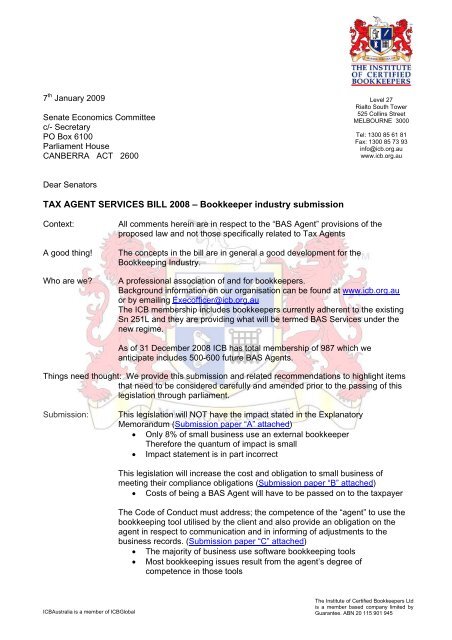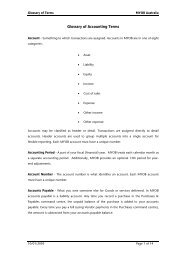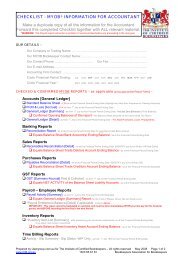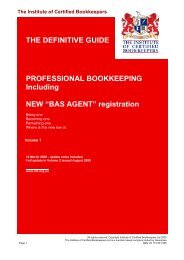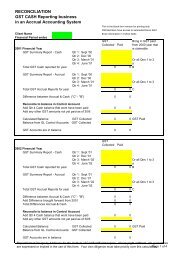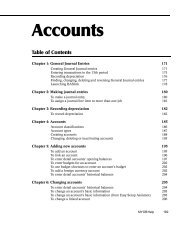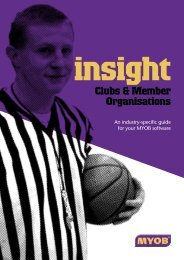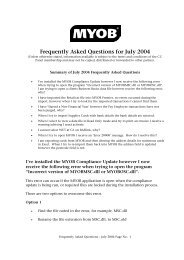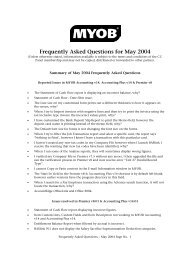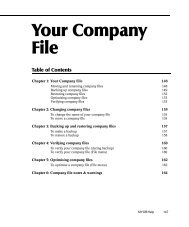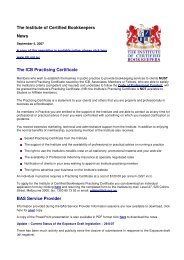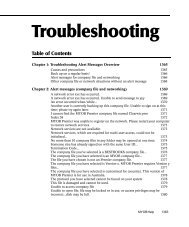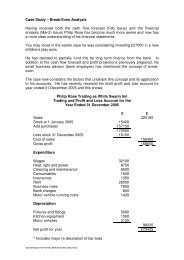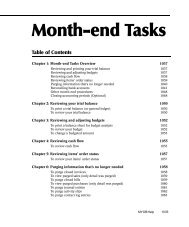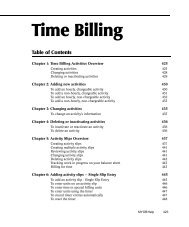TAX AGENT SERVICES BILL 2008 â Bookkeeper industry submission
TAX AGENT SERVICES BILL 2008 â Bookkeeper industry submission
TAX AGENT SERVICES BILL 2008 â Bookkeeper industry submission
You also want an ePaper? Increase the reach of your titles
YUMPU automatically turns print PDFs into web optimized ePapers that Google loves.
7 th January 2009<br />
Senate Economics Committee<br />
c/- Secretary<br />
PO Box 6100<br />
Parliament House<br />
CANBERRA ACT 2600<br />
Level 27<br />
Rialto South Tower<br />
525 Collins Street<br />
MELBOURNE 3000<br />
Tel: 1300 85 61 81<br />
Fax: 1300 85 73 93<br />
info@icb.org.au<br />
www.icb.org.au<br />
Dear Senators<br />
<strong>TAX</strong> <strong>AGENT</strong> <strong>SERVICES</strong> <strong>BILL</strong> <strong>2008</strong> – <strong>Bookkeeper</strong> <strong>industry</strong> <strong>submission</strong><br />
Context:<br />
A good thing!<br />
Who are we?<br />
All comments herein are in respect to the “BAS Agent” provisions of the<br />
proposed law and not those specifically related to Tax Agents<br />
The concepts in the bill are in general a good development for the<br />
Bookkeeping Industry.<br />
A professional association of and for bookkeepers.<br />
Background information on our organisation can be found at www.icb.org.au<br />
or by emailing Execofficer@icb.org.au<br />
The ICB membership includes bookkeepers currently adherent to the existing<br />
Sn 251L and they are providing what will be termed BAS Services under the<br />
new regime.<br />
As of 31 December <strong>2008</strong> ICB has total membership of 987 which we<br />
anticipate includes 500-600 future BAS Agents.<br />
Things need thought: We provide this <strong>submission</strong> and related recommendations to highlight items<br />
that need to be considered carefully and amended prior to the passing of this<br />
legislation through parliament.<br />
Submission:<br />
This legislation will NOT have the impact stated in the Explanatory<br />
Memorandum (Submission paper “A” attached)<br />
• Only 8% of small business use an external bookkeeper<br />
Therefore the quantum of impact is small<br />
• Impact statement is in part incorrect<br />
This legislation will increase the cost and obligation to small business of<br />
meeting their compliance obligations (Submission paper “B” attached)<br />
• Costs of being a BAS Agent will have to be passed on to the taxpayer<br />
The Code of Conduct must address; the competence of the “agent” to use the<br />
bookkeeping tool utilised by the client and also provide an obligation on the<br />
agent in respect to communication and in informing of adjustments to the<br />
business records. (Submission paper “C” attached)<br />
• The majority of business use software bookkeeping tools<br />
• Most bookkeeping issues result from the agent’s degree of<br />
competence in those tools<br />
ICBAustralia is a member of ICBGlobal<br />
The Institute of Certified <strong>Bookkeeper</strong>s Ltd<br />
is a member based company limited by<br />
Guarantee. ABN 20 115 901 945
The bookkeeper / BAS Agent community must be represented and managed<br />
by Board members and committees whom understand and work with this<br />
community and NOT seen as an adjunct to the Tax Agents. (Submission<br />
paper “D” attached)<br />
• Tax Agents are not bookkeepers<br />
Government must actively and aggressively support the introduction of this<br />
legislation through advertising, education support, <strong>industry</strong> support, taxpayer<br />
information. (Submission paper “E” attached)<br />
• The proposed safe harbour provisions are an inadequate and<br />
ineffective incentive for business to use a BAS Agent<br />
• Legislation will be pointless if “unenforced” or unknown<br />
The obligation must be on the Board and not on the applying Agent to process<br />
the application within the required time frame. (Submission paper “F”<br />
attached)<br />
The recognition of BAS Agent Associations should only be those associations<br />
with sufficient numbers of actual BAS Agents. (Submission paper “G”<br />
attached)<br />
Important facets of the Bill must survive the parliamentary process<br />
(Submission paper “H” attached)<br />
Important questions that remain unanswered require practical and due<br />
consideration (Submission paper “I” attached)<br />
Perspective Notes<br />
1. This legislation only affects a very small proportion of BAS preparers.<br />
2. 4% 1 of small business use external contract bookkeepers to assist them with recording<br />
transactions, increasing to 8% assisting them with preparation of the BAS,<br />
3. Generally speaking the bookkeeping <strong>industry</strong> is female, part-time and over 40:70+% 2 .<br />
4. Generally speaking bookkeepers do not have formal qualifications but do have immense<br />
experience.<br />
5. <strong>Bookkeeper</strong>s do not generally have ambitions to be accountants.<br />
6. Software solutions to bookkeeping have greatly assisted business to comply with reporting<br />
including GST & BAS obligations, (60% small business use computers and 60% of those<br />
use accounting software 3 )<br />
7. The bookkeeping <strong>industry</strong> is largely unregulated; the concepts of the proposed bill will for<br />
the majority, aid the improvements occurring in the <strong>industry</strong> but at a cost.<br />
8. With the demise of the number and therefore the capacity of Tax Agents to continue to<br />
assist businesses with Tax Matters let alone BAS matters, every encouragement &<br />
assistance must be provided to <strong>Bookkeeper</strong>s to become BAS Agents<br />
9. What is in the Bill:<br />
1) Creation of a National Tax Practitioners Board<br />
a) replacing the current 6 state based tax agents boards<br />
b) changes to legislation around tax agents<br />
2) Registration of BAS Agents<br />
a) creates a new form of tax practitioner (BAS Agent)<br />
b) registers bookkeepers for the first time<br />
3) Creates a legislated Code of Conduct for registered Agents<br />
1 MYOB Australian Small Business Survey July 2006 – refer Appendix 1<br />
2 ATO <strong>Bookkeeper</strong> Industry Surveys – various – Appendix 2 & others<br />
3 Unreferenced<br />
Page 2 of 28
10. What’s a BAS Agent? A contract bookkeeper (not an employee or owner of the taxpayer)<br />
Who helps a client taxpayer with GST/BAS compliance<br />
a. understanding<br />
b. interpretation<br />
c. completion<br />
d. lodgement<br />
And is relied on by the taxpayer for that help<br />
11. Despite the increase in tax legislation and obligation over recent years the number of tax<br />
agents has decreased with 60% of tax agents now aged 60+ years.<br />
This <strong>submission</strong> is from the perspective of the best implementation in the most effective manner so<br />
that business in Australia is assisted and benefits from this legislation. An incorrect<br />
implementation will unnecessarily increase the red tape burden and compliance cost to business.<br />
In these economic times of concern, we suggest that business and those that support them need<br />
appropriate support and not potentially further burdensome requirements.<br />
In Conclusion<br />
We have been asked and continually ask: Is this Bill justified?<br />
If the new system brought into effect by this Bill is brought in appropriately with due consideration<br />
of real business operations then the formation of the Registered BAS Agent accreditation is a<br />
formal recognition of the good improvements occurring in the <strong>industry</strong>.<br />
If the thought is that legislating and restricting BAS assistance is going to solve the complexities<br />
and concerns of record keeping (as alluded to in the EM) then it will not meet that intention.<br />
Business is already assisted well by bookkeepers and others; this legislation will not fix the errors<br />
occurring.<br />
Please contact us if you wish to discuss this matter in any form.<br />
Yours faithfully<br />
Matthew Addison<br />
Executive Director<br />
Page 3 of 28
Submission paper “A”<br />
This legislation will NOT have the impact stated in the Explanatory<br />
Memorandum<br />
Context<br />
The impact statement alludes to problems with bookkeepers causing issues for tax agents. These<br />
comments are both unfair and unwarranted.<br />
The underlying problem is a lack of currency in the competence & education of many<br />
“intermediaries” (Accountants, Tax Agents & <strong>Bookkeeper</strong>s) especially in relation to the use of<br />
bookkeeping/accounting tools (refer <strong>submission</strong> paper C for further elaboration on this point).<br />
The impact statement does not adequately recognise the status, the segments, the cost structure<br />
nor the profile of the <strong>Bookkeeper</strong> <strong>industry</strong>.<br />
We provide comment on the <strong>industry</strong> and then extract parts of the Explanatory Memorandum<br />
Impact Statement worthy of comment and correction.<br />
Recommendations are made throughout.<br />
<strong>Bookkeeper</strong> Industry Background<br />
The bookkeeper community is made up by 3 distinct segments:<br />
1) related or connected to the business.<br />
2) employed by the business,<br />
3) external or contract bookkeeper providing services to multiple businesses (includes within<br />
the accounting role),<br />
The range of services provided vary from the keeping of the books (bookkeeping duties) to general<br />
administrative tasks, secretarial tasks, general office duties.<br />
The term “Bookkeeping” does include: making and recording purchases and payments; payroll<br />
calculations, recording and reporting; Sales invoice generation, banking, receipting, reconciling<br />
bank statements, GST recording, reconciling and reporting; accounts payable; accounts<br />
receivable; inventory receiving, issuing, ordering, recording and reporting.<br />
The Tax Agent Services Bill <strong>2008</strong> only relates to segment 3 “external or contract bookkeepers”<br />
Only 8% of businesses indicating they use an external person (bookkeeper 4%, accountant 3%,<br />
other 1%) to enter transactions. 4 (Most 83%of small business owners enter transactions<br />
themselves with 21% also using another person “related or connected” to the business. 15% use<br />
an employee to enter transactions.)<br />
In relation to preparation and lodgement of the BAS (ignoring any definitional issues for the<br />
moment) 75% of businesses prepare and 72% lodge their own Business Activity Statement<br />
(“BAS”) 5 with only 8% utilising a bookkeeper to prepare and 4% to lodge the statement.<br />
4 MYOB Australian Small Business Survey July 2006 – refer Appendix 1<br />
5 MYOB Australian Small Business Survey July 2006 – Appendix 2<br />
Page 4 of 28
Three observations<br />
1) Businesses utilise different people to provide different aspects of their many record keeping<br />
and compliance duties<br />
2) Businesses may engage a bookkeeper to assist them with entering transactions 4%, but<br />
then more businesses engaged a bookkeeper to prepare the BAS 8%; indicating the<br />
multifunction roles but also the different types of engagement of external bookkeepers<br />
3) Only 8% of small business engage an external bookkeeper to assist with preparation<br />
of the BAS.<br />
Assuming the number of small businesses in Australia can be accepted to be 1.7m this indicates<br />
136,000 small businesses will be affected by this legislation.<br />
ATO bookkeeper <strong>industry</strong> surveys (unreferenced) indicate that the professional bookkeeper works<br />
with between 15 & 20 clients on average resulting in an indicative number of external bookkeepers<br />
active in the Australian market of approximately 8,000.<br />
The number of bookkeepers has been debated and estimated at anything from the above 8,000 to<br />
35,000 external contract bookkeepers working with small business, and between 130,000 and<br />
250,000 in the total <strong>industry</strong> as “bookkeepers” (excludes the owner, related bookkeeper segment.)<br />
Therefore the Bill will only effect those external bookkeepers servicing 8% of small business and<br />
then only relates to those bookkeepers who advance their level of services to include “BAS<br />
Services”.<br />
The profile of a bookkeeper is predominantly: female, part time, forty+ year olds who work by<br />
themselves without any real form of relevant interaction 6<br />
Their charge rates vary from $15 per hour to in excess of $200 per hour (for senior software<br />
consultants of management work) with the skill set and qualifications exhibiting the same degree of<br />
variation and range.<br />
Explanatory Memorandum – Chapter 6 – Regulation impact statement – Extracts &<br />
Comments<br />
The legislation has a basis and rationale based on the Regulation Impact Statement<br />
Parts of the impact statement are accurate and represent a sound basis for change and for parts of<br />
the proposed legislation, however there are inaccuracies and misrepresentations contained therein<br />
that should be revised prior to accepting that the change in the way prescribed and for the reasons<br />
prescribed are appropriate.<br />
Extract:<br />
Inadequacy of consumer protection<br />
6.16 For consumers, the narrow focus of the existing regulatory framework has two consequences:<br />
• The first relates to quality of service provision. The different degrees of regulation under the current<br />
law for the provision of different types of tax agent services results in services of varying standards.<br />
For example, throughout consultation on these reform proposals, participants have communicated<br />
that the limited regulation of the provision of BAS services under the current law has allowed for a<br />
low standard of service provision, with tax agents frequently being required to re-perform work<br />
6 ATO initiated research into <strong>Bookkeeper</strong> <strong>industry</strong> by TNS 2006 – Appendix 3<br />
Page 5 of 28
completed by bookkeepers to ensure its accuracy. The need for re-performance could cause inflation<br />
of costs to consumers and a decline in confidence in the <strong>industry</strong>.<br />
COMMENT:<br />
i) Earlier comment provided detail as to who businesses use to enter data into their accounting<br />
records and who businesses use to assist them with preparation and lodgement of their BAS.<br />
92-96% of bookkeeping work is NOT performed by people who will be regulated by this legislation.<br />
The basic recording of business transactions will continue to be performed in the majority by<br />
business owners themselves or their employees.<br />
“The need for re-performance” is an education issue for all recorders of business records and the<br />
accountants who use those records.<br />
Although the legislation seeks to address part of this issue it does not adequately address nor<br />
adequately provide for tax agents to enhance their communication with the taxpayer or their record<br />
keepers.<br />
There is as much evidence of tax agents who refuse to use prepared records provided by<br />
businesses or who do not understand contemporary computer accounting programs and thereby<br />
insist on re-keying every transaction themselves for no other reason than they are not prepared to<br />
accept the records provided.<br />
This legislation DOES NOT address the majority of record keepers being business owners<br />
themselves or their employees nor is it able to address the multiple record keeping mechanisms<br />
available nor the magnitude of alternate methods of business records keeping and hence this<br />
legislation is NOT ABLE to have the stated impact.<br />
Also the existing regulatory framework has nothing to do with this alleged impact described in<br />
paragraph 6.16.<br />
Accordingly this argument should be removed from the legislation, especially the statement that is<br />
a slight on bookkeepers.<br />
RECOMMENDATION A1: The stated impact in paragraph 6.16 of the EM be removed.<br />
ii) Inaccuracies in record keeping is a result of complexity of the systems enforced upon business<br />
and not as a result of “work performed by bookkeepers”.<br />
The complexity of the BAS itself requiring classification of transactions into types of GST reporting<br />
complicates basic record keeping far beyond what could be required simply to report the GST<br />
collected and GST Input Tax credit entitlement.<br />
RECOMMENDATION A2: That the Senate Committee recommends the review of the GST<br />
reporting obligations currently required on the Business Activity Statement with the aim of<br />
removing G1 to G20 reporting and hence the BAS would only require the reporting of GST<br />
Collected and GST Input Tax Credit claimed.<br />
RECOMMENDATION A3: In order to state an impact that the legislation will have, the following<br />
should be included under a different heading of the impact statement “Positive effects of the<br />
legislation”<br />
• Agents must be competent to provide the services for which they are engaged and be competent and<br />
qualified to utilise the record mechanism provided to them by the client. Agents must advise clients<br />
Page 6 of 28
of changes made to the business records. This will prevent the accountant or bookkeeper reworking<br />
the information into a different form and the business needing to recreate the adjustments provided<br />
by the agent. Hence these actions will remove the need for re-performance of part of the business<br />
records. Any need for re-performance or duplication of recording does cause additional cost to<br />
consumers..<br />
Extract:<br />
The second quoted paragraph of 6.16<br />
• The second consequence relates to market competition which is affected by the presence of the<br />
inappropriate barriers to entry described above. The entry barrier for providers of BAS services, for<br />
example, is not aligned with the skills and knowledge required to provide BAS services. This<br />
misalignment allows certain unqualified people to provide BAS services while preventing other<br />
qualified people from providing BAS services. This disrupts the efficient operation of a competitive<br />
market which benefits consumers. Further, the fact that the requirement that an individual be<br />
working under the direction of a registered tax agent is rarely enforced (due to uncertainty as to its<br />
meaning) also creates incentive and opportunity for illegal operators in the market and exposes<br />
clients to risk.<br />
COMMENT: The “entry barriers” exist and are substantial for providers of BAS services to adhere<br />
to the current Sn 251L.<br />
Unfortunately what this paragraph indicates is that the current law is not enforced. “rarely enforced”<br />
is not a valid reason to create another piece of legislation.<br />
Unless government provide sufficient market place information concerning businesses using only<br />
qualified and competent agents (and now under this legislation “registered” agents) their will be no<br />
change to the “consequence” listed.<br />
Unless government provide sufficient resource in order to enforce the new legislation the system<br />
will have the same result as under the existing system – it will be criticised due to lack of regulation<br />
or lack of enforcement.<br />
RECOMMENDATION A4: Government must be responsible for allocation of significant funding<br />
and resources to enable communication to all taxpayers concerning the use of registered Agents,<br />
including especially BAS Agents and to all intermediaries as to what functions require an entity to<br />
be registered.<br />
Extract:<br />
Threat to the integrity of the tax system<br />
6.20 Increasing complexity in the taxation laws has corresponded with an increasing<br />
proportion of the taxpaying public engaging the services of tax specialists to assist them to<br />
comply. With a regulatory framework that is inflexible and too narrow, the risk of incompetent<br />
work being performed is high. This could lead to a lower level of compliance, thereby<br />
subjecting taxpayers to additional risk and impacting on revenue collection.<br />
6.21 In addition, uncertainty in the current law, inflexibility in its administration and<br />
excess demand created by inappropriate entry barriers have allowed illegal operators in the<br />
market which undermines the integrity of the tax system. For example, anecdotally, some BAS<br />
services are currently being provided unlawfully by unregulated entities.<br />
COMMENT: This legislation will not fix the wider issues noted here nor will it have an impact on<br />
them without adequate enforcement by the authority.<br />
92-96% of business perform their own record keeping and lodge their own BAS.<br />
Page 7 of 28
RECOMMENDATION A5: Senate must ensure that adequate funding is provided for enforcement<br />
of the new legislation particularly in relation to the prosecution of “unregistered” entities.<br />
RECOMMENDATION A6: the last line of 6.21 is offensive to a segment of the potential “Agent”<br />
population and should be removed as there is more far documented and proven evidence of<br />
unregulated tax agents.<br />
Extract:<br />
Impact group identification<br />
6.33 The measure will impact on all taxpayer groups (including individuals and businesses which do or<br />
do not use the services of tax agents), tax agents, bookkeepers and other intermediaries, professional<br />
and para-professional associations, the state Boards, and the ATO. Many tax agents and bookkeepers<br />
operate as small businesses.<br />
COMMENT: This legislation only provides regulation on entities providing Tax or BAS Services for<br />
a fee, therefore the width of this “group identification” is inaccurate..<br />
RECOMMENDATION A7: Remove paragraph 6.33<br />
Extract:<br />
6.34 There are currently approximately 26,000 registered tax agents who will be directly impacted by<br />
these proposals. In addition, the ATO has advised that there are a further 11,000 nominees (of<br />
partnership and company registered tax agents) who will be affected. In terms of other intermediaries,<br />
there are over 120,000 people working in the bookkeeping <strong>industry</strong>, 10 to 15 per cent (12,000 to<br />
18,000) of who are in business lodging BASs for clients for a fee.<br />
COMMENT: The number of “in business lodging BASs for clients for a fee” is an estimate provided<br />
by the ATO in their compliance statements in 2006. It is our opinion and many others that this is<br />
excessive and does not indicate the size of the likely registered BAS Agent population.<br />
COMMENT: Due to the lack of enforcement and lack of knowledge provided to taxpayers or<br />
intermediaries we believe many may be assisting business to complete the BAS to an extent that is<br />
not currently permitted due to a lack of knowledge of the current law.<br />
RECOMMENDATION A8: Remove the final line of paragraph 6.34<br />
Extract:<br />
Analysis of costs<br />
Compliance costs<br />
6.42 The ATO has estimated that the potential transitional compliance cost impact of the<br />
measure (with a medium level of confidence) will be:<br />
• a small cost for tax agents and BAS agents with the appropriate qualifications:<br />
– The requirements for registration as a tax agent will remain largely the same as<br />
under the existing law. On transition, registration under the current law will be<br />
taken as registration under the new law.<br />
– Although the measure represents a strengthening of the existing framework,<br />
there are likely to be some transitional compliance costs associated with<br />
learning about the changes. This could be partially offset by increased certainty<br />
about tax agents’ rights and responsibilities.<br />
– The ATO has advised that approximately 50 per cent of the bookkeepers who<br />
are currently in business lodging BASs for clients for a fee are expected to<br />
Page 8 of 28
already hold the required Certificate IV Financial Services qualification in<br />
either bookkeeping or accounting.<br />
COMMENT: The committee should be aware that the bookkeeping <strong>industry</strong> believe this “50 per<br />
cent” to be grossly overstated<br />
– New entrants seeking registration as BAS agents will need to pay a registration<br />
application fee, proposed to be $100 or $50 (depending on whether or not the<br />
agent is carrying on a business), and will also need to obtain professional<br />
indemnity insurance.<br />
COMMENT: We fully support the low registration fee as the costs to be borne by the aspiring BAS<br />
Agent and therefore passed onto their clients are already significant.<br />
The committee should be aware that while the level of professional indemnity insurance within the<br />
bookkeeping <strong>industry</strong> is increasing the relative portion of those holding appropriate insurance is<br />
likely to be around 1000 in total<br />
–<br />
• a potentially large cost for those bookkeepers who are currently in business lodging<br />
BASs for clients for a fee (and who are expected to seek registration as BAS<br />
agents) but do not currently meet the minimum standard of qualification. The cost<br />
of obtaining the necessary qualification will crystallise after two years and may be<br />
spread over as many as five years for many bookkeepers, given the proposed<br />
transitional arrangements. As many bookkeepers operate as small businesses, these<br />
costs do reflect (at least in part) a cost of the measure to small business:<br />
– The transitional compliance cost for bookkeepers without the necessary<br />
qualifications is estimated to be up to $15,000 each ($110 million for a<br />
population of approximately 7,500), however 78 per cent of this cost estimate<br />
reflects the estimated opportunity cost of gaining the required qualification.<br />
– Many education providers grant credit (in some cases up to 100 per cent) for<br />
relevant prior study and/or work experience. It is anticipated that a large<br />
number of bookkeepers will be eligible for such credit, and this will<br />
significantly reduce the initial compliance costs. For example, if 50 per cent of<br />
the course is granted in recognition of relevant work experience,<br />
implementation costs are expected to be $8,700 per bookkeeper ($65 million for<br />
a population of 7,500).<br />
6.43 Ongoing compliance costs are estimated to be:<br />
• nil/minimal for tax agents; and<br />
• small, at $1 million per annum, for BAS agents (approximately $67 each per<br />
annum):<br />
– The registration application fee will be payable at most once every three years.<br />
Other expected costs are those associated with continuing education.<br />
COMMENT: Refer <strong>submission</strong> paper B – paragraph 6.43 of the impact statement is wrong.<br />
–<br />
6.45 The introduction of the ‘safe harbour’ provisions may impose some costs on agents in<br />
terms of record-keeping.<br />
COMMENT: Refer <strong>submission</strong> paper “E” in relation to the effectiveness of the safe harbour<br />
provisions.<br />
Page 9 of 28
Administrative costs<br />
COMMENT: Paragraphs 6.46 through6.49 deal with the administrative costs of the proposed<br />
legislation. The paragraphs appear to omit any reference to the actual costs of the members of the<br />
Tax Practitioners Board and the respective subcommittees.<br />
RECOMMENDATION A9: A full estimate of Board personnel and committee members, together<br />
with time and therefore cost estimates be provided and included in the Administrative Cost impact.<br />
Page 10 of 28
Submission paper “B”<br />
This legislation will increase the cost to small business of meeting their<br />
compliance obligations<br />
Context<br />
Most of the aspiring BAS agents will progress from the ranks of the bookkeeper or (software)<br />
consultants.<br />
Although this <strong>industry</strong> is developing, the legislation will enforce those that choose to be BAS<br />
agents to undertake education or have previous education updated, to obtain or enhance<br />
infrastructure and embrace appropriate Professional Indemnity Insurance. Both the cash cost and<br />
the opportunity cost indicated in the impact statement are real but they will have to be passed onto<br />
the consumer if the BAS Agent is to remain a viable business.<br />
The vast majority of bookkeepers do not have professional indemnity insurance and this must be<br />
taken into account.<br />
The vast majority do not have current qualifications to the required level and this must be taken<br />
into account.<br />
Approximate costs of entering the system as a Registered BAS Agent<br />
The typical subcontract bookkeeper works part-time, 3 days a week 6 hours a<br />
day for 38 weeks of the year. They charge around $45 per hour.<br />
Total available working hours 684<br />
Their gross earnings are $ 30,780<br />
Based on the requirements stated in the exposure draft the Costs of being a<br />
Registered BAS Service Provider are estimated as follows:<br />
First year Ongoing<br />
Direct Costs<br />
Proving education level or competence $ 1,600<br />
Professional Indemnity Insurance $ 600 $ 600<br />
Continuing Professional Development 15 hours $ 1,000 $ 1,000<br />
Computerisation – Hardware $ 1,000 $ 1,000<br />
Computerisation – Internet Access $ 500 $ 500<br />
Application Fee $ 30<br />
Total $ 4,730 $ 3,100<br />
Revised Gross income to<br />
provide equivalent earnings $ 35,510 $ 33,880<br />
Loss of Billable Time First year Ongoing<br />
Proving education level 24 hours -<br />
Ongoing CPD - 12 hours<br />
Administration 6 hours 6 hours<br />
Total 30 hours 18 hours<br />
Page 11 of 28
Revised available billable hours 654 662<br />
Therefore revised charge rate must increase to $ 54.30 $ 51.17<br />
The increased cost to each business of having the bookkeeping work provided<br />
by persons who must register as a BSP is an increase of 20% in cost to<br />
business in the first year (13.7% thereafter).<br />
It is therefore essential that government embrace every support to the aspiring BAS Agent.<br />
COMMENT: Due to these costs and the reluctance or inability to incur these additional costs:<br />
many bookkeepers will embrace this regime by working with other bookkeepers who are the<br />
Registered BAS Agent. The costs of being registered will restrict the entry of many bookkeepers<br />
from becoming BAS Agents in their own right – not due to competence of qualification but due to<br />
the financial impost.<br />
RECOMMENDATION B1: The financial impact statement should be amended to include a 20%<br />
increase in costs to business.<br />
RECOMMENDATION B2: The Government should establish an education sponsorship scheme<br />
specifically aimed at funding the updating or embracing of education to the required standard by<br />
aspiring BAS Agents.<br />
RECOMMENDATION B3: The Government must recognise the low revenue base and therefore<br />
the immense financial impact that any increase to cost has on the majority of aspiring BAS Agents.<br />
RECOMMENDATION B4: The Government notes the significantly different risk profile of a<br />
bookkeeper / BAS Agent and therefore will require the Tax Practitioners Board to set a standard of<br />
Professional Indemnity insurance for the BAS Agent that is both responsible but recognisant that<br />
they are not accountants nor tax agents..<br />
Page 12 of 28
Submission paper “C”<br />
The Code of Conduct must be enhanced in respect to communication of the competence of<br />
the “agent” to use the bookkeeping tool utilised by the client and in informing of<br />
adjustments in order to achieve part if the intended impact.<br />
Context<br />
The problems indicated in the impact statement with bookkeepers significantly result from the lack<br />
of skills and currency demonstrated by many tax agents in the use of current computer accounting<br />
software programs and their lack of communication of the limits of those skills.<br />
Also the lack of communication of adjustments that the accountant has performed in order to bring<br />
the clients records into line with the finalised accounts.<br />
COMMENT: These issues apply to all books provided by all businesses, while this legislation<br />
addresses the BAS Agent/<strong>Bookkeeper</strong> in their preparation of the books, it also addresses all Tax<br />
Agents who use those books for end of year tax purposes and therefore this legislation has the<br />
opportunity to create an improved position for all Agents in interacting with all providers of the<br />
books and records.<br />
As the code of conduct is being brought into place to enhance the behaviour and professionalism<br />
of all agents we believe it should specifically address the major issues between bookkeepers and<br />
accountants:<br />
The use and ability to use the bookkeeping mechanism (software) of the client<br />
The communication of adjustments or issues with any bookkeeping<br />
The Code of Conduct includes a principle of Competence however all provisions of this part of the<br />
code are made in terms of their technical or tax knowledge.<br />
There is no mention of communication obligations nor competence in utilising the bookkeeping<br />
mechanism.<br />
The Bill contains<br />
(8) You must maintain knowledge and skills relevant to the * tax agent services that you provide.<br />
The EM contains<br />
3.43 To ensure that services provided on their behalf are provided competently, tax<br />
agents and BAS agents must ensure that the provider of the service has appropriate skills<br />
and experience, and that their work is adequately supervised or otherwise reviewed.<br />
RECOMMENDATION C1: The Bill be amended to include a Code of Conduct requirement for the<br />
Agent to communicate with the client or other intermediaries working with the client in relation to<br />
record keeping matters and the notification of adjustments made to the records of the business.<br />
RECOMMENDATION C2: The Bill be amended to include a Code of Conduct requirement for the<br />
Agent to “Maintain knowledge and skills relevant to the method of record keeping utilised by their<br />
clients”<br />
RECOMMENDATION C3: The EM be amended to include specific requirement and description of<br />
the obligation on the agent to either provide notification of the types of adjustments made to the<br />
information provided in forming the end of year financial statements (or for any other financial<br />
Page 13 of 28
period), or to work directly with the client or other intermediary in ensuring the clients books of<br />
record are amended to include the adjustments.<br />
RECOMMENDATION C4: The EM be amended to include specific requirement and obligation on<br />
the Agent to either; have the skills and bookkeeping tools in house in order to utilise the<br />
bookkeeping mechanism of the client, or to ensure the agent does not undertake work which relies<br />
on a bookkeeping mechanism that they do not have the requisite skills and competence.<br />
Page 14 of 28
Submission paper “D”<br />
The bookkeeper / BAS Agent community must be represented and managed by Board<br />
members and committees whom understand and work with this community and NOT seen<br />
as an adjunct to the Tax Agents.<br />
Context<br />
<strong>Bookkeeper</strong>s/BAS Agents are not Tax Agents nor accountants, nor do they have aspirations to be.<br />
They assist businesses primarily in a different form and operate in more detail and typically with<br />
more regularity than the accountants.<br />
The bookkeeper <strong>industry</strong> has developed (until relatively recently) informally but assists the majority<br />
of businesses in meeting their compliance obligations.<br />
The <strong>industry</strong>, background, context is different and accordingly the regulatory body must consider<br />
their introduction into a regulatory framework differently.<br />
The BAS services including all the work, recording and reporting required to provide the assistance<br />
to business to meet their BAS obligations while overlapping with the work required to be provided<br />
for income tax purposes is by definition different and more related to the detail of each and every<br />
transaction, requiring a different set of understanding by the Board in their provision of guidance<br />
and determinations.<br />
COMMENT:<br />
The bookkeeping <strong>industry</strong> has been consulted and involved in reviews of the proposed system.<br />
The Bill & EM in its current form contains consideration of much of that process.<br />
Due to the “principle” nature of the legislation and the extensive reliance on the new Tax<br />
Practitioners Board to bring this legislated system into being it is essential that the Board<br />
comprises of members of the BAS agent community and that the committees formed to implement<br />
and administer the system are established with a view to the differences between Tax Agents and<br />
BAS Agents and therefore there may be distinctions between committees for the different<br />
segments.<br />
Extract from the EM:<br />
Functions<br />
5.34 the functions of the Board are to:<br />
• administer the system for the registration of tax agents and BAS agents —<br />
registration of agents is discussed in detail in Chapter 2 of this explanatory<br />
memorandum;<br />
• investigate applications for registration and conduct that may breach the Bill,<br />
including non-compliance with the Code — investigations are discussed in more<br />
detail below, and the Code is explained in Chapter 3 of this explanatory<br />
memorandum;<br />
• impose administrative sanctions for non-compliance with the Code;<br />
• issue guidelines, which are legislative instruments, to assist in achieving the<br />
functions outlined above;<br />
• undertake other functions conferred on the Board by the Bill, the regulations, or<br />
any other law of the Commonwealth; and<br />
Page 15 of 28
[Section 60-15]<br />
• do anything else related to the performance of its functions.<br />
5.35 Guidelines issued by the Board are legislative instruments that bind the Board and those to<br />
whom they apply. Under the Legislative Instruments Act 2003, legislative instruments are<br />
generally required to be exposed for consultation with relevant parties, including those<br />
proposed to be affected by the instrument. They must be tabled in both Houses of<br />
Parliament and entered onto the Federal Register of Legislative Instruments by a specified<br />
date.<br />
RECOMMENDATION D1: The Tax Practitioners Board must include members of the BAS Agent /<br />
<strong>Bookkeeper</strong> community.<br />
RECOMMENDATION D2: The Boards delegated committees must consult include members of<br />
the BAS Agent / <strong>Bookkeeper</strong> community.<br />
RECOMMENDATION D3: The Board and its committees must work with the BAS Agent /<br />
<strong>Bookkeeper</strong> community prior to issuing legislative determinations that effect the operations of the<br />
BAS Agent.<br />
Page 16 of 28
Submission paper “E”<br />
Government must actively and aggressively support the introduction of this legislation<br />
through advertising, education support, <strong>industry</strong> support, taxpayer information.<br />
Context<br />
This legislation will not make any difference unless adequate communication is provided by<br />
government to the taxpayer community<br />
COMMENT: Many of the above recommendations address this issue<br />
COMMENT: The safe harbour provisions provided in the legislation as follows<br />
Extract:<br />
Safe harbour from penalties<br />
1.24 taxpayer who uses a tax agent or BAS agent will benefit from a safe harbour from<br />
certain administrative penalties in certain circumstances. Penalties will no longer apply:<br />
• where a false or misleading statement is made carelessly, provided the taxpayer has<br />
taken reasonable care to comply with their tax obligations by giving their tax agent<br />
or BAS agent the information necessary to make the statement; and<br />
• where a document (such as a return, notice or statement) is not lodged on time in<br />
the approved form due to the tax agent’s or BAS agent’s carelessness, provided the<br />
taxpayer gave the agent the necessary information, in sufficient time, to lodge the<br />
document on time and in the approved form.<br />
EM: 6.52 There is expected to be a cost to revenue associated with the introduction of ‘safe<br />
harbour’ provisions which exempt taxpayers from administrative penalties in certain<br />
circumstances.<br />
6.53 The safe harbour from tax shortfall penalty will apply if taxpayers demonstrate that<br />
they took reasonable care by engaging a registered agent and providing them with all necessary<br />
tax information, but the agent carelessly made a false or misleading statement that resulted in a<br />
shortfall amount. The cost of this safe harbour is unquantifiable (meaning that there will be a<br />
cost, but that it cannot be measured reliably) due to a lack of data on the percentage of penalties<br />
raised due to careless tax agent errors, where the taxpayer has provided them with the correct<br />
information.<br />
6.54 The safe harbour from administrative penalty for failing to lodge a document on<br />
time and in the approved form is proposed to apply if taxpayers establish that they engaged a<br />
registered agent, gave their agent all relevant information to enable the lodging of a document<br />
on time in the approved form and the agent carelessly failed to do so. The cost of this safe<br />
harbour is unquantifiable due to a lack of data on the percentage of penalties raised due to tax<br />
agent carelessness, as well as the unknown impact of the exemption on the behaviour of<br />
taxpayers and their agents.<br />
6.55 In both cases, the sensitivity analyses suggest that a small change in the assumed<br />
percentage of tax agent errors can have a large impact on the cost estimates.<br />
OBSERVATION: 6.53 states “the cost of this safe harbour is unquantifiable…cannot be measured<br />
reliably” and 6.54 states the same<br />
COMMENT: The safe harbours have been established with the intention to provide incentive to<br />
businesses to use a “registered” and therefore “legal” agent to assist them rather than to continue<br />
to use “unregistered” assistance.<br />
Page 17 of 28
No evidence has been provided at any stage of development to quantify the total penalty amounts<br />
received by Revenue in relation to these penalties. We would understand that they are rarely<br />
applied and accordingly not understood nor known by the taxpayer community.<br />
It is our contention that these safe harbours will be totally ineffective in achieving this result and are<br />
substantially inadequate as an incentive to business to incur additional cost to engage a<br />
“registered” agent.<br />
RECOMMENDATION E1: Government must seek to establish further incentives to business to<br />
utilise the services of a registered BAS Agent<br />
RECOMMENDATION E2: A system of BAS liability concession should be implemented whereby<br />
each business who utilises a registered BAS Agent is permitted to deduct $200 from each BAS<br />
reviewed and lodged by that Agent.<br />
RECOMMENDATION E3: That lodgement timeframes are extended for registered BAS Agents<br />
thereby allowing further incentive for businesses to use a BAS Agent and to allow levelling of the<br />
workload for BAS Agents over a greater period of time.<br />
Page 18 of 28
Submission paper “F”<br />
The obligation must be on the Board and not on the applying Agent to process the<br />
application within the required time frame.<br />
Extract<br />
Bill:<br />
20-25 Registration<br />
(3) If the Board does not decide your application within 6 months of receiving it, the<br />
Board is taken to have rejected your application.<br />
However, this does not apply if your application is for renewal of your registration.<br />
Note: For renewals of registration, see section 20-50.<br />
EM 2.23 The Board has a period of six months from receiving an application for registration in which to<br />
decide whether to grant or refuse registration. If the Board has not made a decision within this six-month<br />
period, the Board is taken to have rejected the application. This time limit provides certainty and finality for<br />
entities seeking to be registered and allows an entity who has not been granted registration to have their<br />
application reviewed by the AAT — refer to paragraphs 2.66 to 2.68 for further information about AAT<br />
review of Board decisions.<br />
COMMENT: The obligation must be on the Board to process an application for registration within a<br />
reasonable time. The obligation should not be on the applicant to incur further cost of application<br />
to initiate an AAT process in order to simply have an application for registration appropriately<br />
processed.<br />
RECOMMENDATION F1: The Bill be amended to read “If the board does not decide your<br />
application within 6 months of receiving it, the board is taken to have issued a temporary<br />
registration for the period until the finalisation of the application to register process.<br />
Page 19 of 28
Submission paper “G”<br />
The recognition of BAS Agent Associations should only be those associations with<br />
sufficient numbers of actual BAS Agents.<br />
Context<br />
While this matter is related to detail that is yet to be provided within the Regulations, it relates to<br />
provisions of the Bill<br />
The draft regulations provided during 2007 indicated the following provision in relation to<br />
recognition of BAS Agent Associations:<br />
209 Each voting member of the organisation has been awarded at least a Certificate IV Financial<br />
Services (Bookkeeping), or a Certificate IV Financial Services (Accounting), from:<br />
(a) a registered training organisation; or<br />
(b) an equivalent institution.<br />
An earlier paragraph required the following<br />
202 The organisation has:<br />
(a) at least 1 000 voting members; or<br />
(b) at least 500 voting members who are BAS agents registered under the Act;<br />
or both.<br />
COMMENT: a Recognised BAS Agent Association will continue a role with all bookkeepers many<br />
of whom will not seek the level of education prescribed in 209 yet wish to be validated at a<br />
membership level appropriate to their skills and otherwise proven competence. They also wish to<br />
contribute to the association as voting members.<br />
Accordingly not all voting members may have the required educational level to be a BAS Agent yet<br />
the regulations would require that to be a voting member of such an association they would need<br />
to.<br />
COMMENT: We anticipate that professional associations will maintain members at different levels<br />
and will accredit BAS Agent registered members separately from non BAS Agents.<br />
RECOMMENDATION G1: that paragraph 209 only apply to part (b) of paragraph 202<br />
Alternatively the numbers listed in paragraph 202 should be “at least 1000 voting members with the<br />
education requirements stipulated in paragraph 209; or….”<br />
Page 20 of 28
Submission paper “H”<br />
Important facets of the Bill must survive the parliamentary process.<br />
Comment<br />
Important facets of the legislation<br />
These significant items were either included in the drafts of the legislation and must survive the<br />
parliamentary process:<br />
A: Delayed start to the imposition following it becoming law<br />
This is required to allow positive progression of the bookkeepers into the formalisation and<br />
regulation now being brought to them; allows logical and effective adoption decisions to be<br />
made, preventing exploitation of the bookkeepers and to prevent mass exit from the<br />
<strong>industry</strong>. The new Board has significant work to undertake to bring into place all the<br />
infrastructure, systems and policies required<br />
B: Transitional provisions allow progressive entry and development<br />
Once the board is able to provide definitive direction and systems, the bookkeepers must<br />
be given time to implement the systems required. If the new system as drafted were to be<br />
imposed with immediate “no transitional” time frame then many bookkeepers would be<br />
unable to legally provide the assistance they have been providing to their business clients<br />
and many many Activity Statements would either not be lodged or be lodged incorrectly.<br />
C: Educational provisions at Certificate IV level including the new “Bookkeeping”<br />
accreditation are essential<br />
The law requires BAS Agents to obtain at least by the time of renewal of their registration<br />
educational qualification to at least Financial Services Certificate IV (Accounting) or<br />
(Bookkeeping). The “Bookkeeping” Cert IV is an absolutely appropriate development and<br />
qualification for the <strong>industry</strong> and proposed BAS Agent)<br />
D: <strong>Bookkeeper</strong>s (BAS Agents) must be represented on the board and have its own<br />
appropriate committees for registration, discipline, education…….<br />
<strong>Bookkeeper</strong>s and therefore the majority of BAS Agents are not accountants and do not<br />
have the ambitions, position nor perspective of the accounting profession. It would be<br />
inappropriate for the bookkeeping <strong>industry</strong> to be governed only from the same perspective<br />
that exists for the tax agent <strong>industry</strong>. BAS agents must have their own representation<br />
E<br />
Accountants who want a BAS Agent licence must have proven relevant experience<br />
The latest draft included provisions that Accountants (who did not have a full Tax Agents<br />
licence) would NOT be allowed to automatically receive a BAS Agents licence unless they<br />
had sufficient proven relevant experience. This requirement is a must if the competency<br />
and professionalism of the BAS Agent is to retain its integrity. Too many accountants have<br />
not had relevant experience nor exposure to the appropriate laws in order to adequately<br />
continue to act as a BAS Agent.<br />
F: Not all bookkeeping work should require registration under this law<br />
The new system will impose a cost and infrastructure obligation on those wishing to be BAS<br />
Agents (Professional Indemnity Insurance, Cost of initial education, cost of meeting<br />
registration obligations, cost of ongoing professional development) which is appropriate.<br />
However many businesses engage bookkeepers to perform processing tasks that do not<br />
require the higher levels of education, insurance and resource. Therefore the law MUST be<br />
very clear that ordinary bookkeeping work does not require a registered BAS Agent<br />
whereas GST/BAS interpretation, certainty and ATO representation does.<br />
Page 21 of 28
G: The Explanatory Memorandum must be very clear as to what duties/functions of a<br />
bookkeeper are to be defined as BAS Services only to be performed by a registered<br />
BAS Agent.<br />
H: Specialist registrations must be embraced<br />
The Bill & EM allow for the existence of specialty registrations which we envisage will be a<br />
significant component of registrations: For instance payroll operators whom have a<br />
responsibility for generating the PAYG Withholding numbers for the BAS but are not<br />
involved in any other segment of the BAS.<br />
Page 22 of 28
Submission paper “I”<br />
Important questions remain unanswered that require practical and due consideration<br />
Context<br />
Many issues are contemplated to be considered and determined by the Tax Practitioners Board.<br />
However we note that due to the functions of the Board as prescribed in the Bill & EM that it would<br />
appear there are some definitional issues that will revert back to the ATO.<br />
ISSUES FOR THE BOARD TO ISSUE IMMEDIATE GUIDANCE<br />
Transitional provisions:<br />
Definition of<br />
“Relevant Experience”<br />
“Reasonable period”<br />
“Competent standard”<br />
Parameters and guidance around 1400 hours<br />
Requirements and specifications of PI policies<br />
Further guidance as to educational qualifications:<br />
currency of required qualification<br />
guidance as to “course in basic GST/BAS taxation principles”<br />
ISSUES THAT MUST RECEIVE FINAL GUIDANCE<br />
We are not certain that the provision of final guidance on some definitional issues under<br />
the Bill fall within the role of the Tax Practitioners Board, however they require final<br />
clarification:<br />
Understanding & confirmation of the definition of BAS services especially with recognition that not<br />
all bookkeeping functions nor are all bookkeepers going to be BAS Agents<br />
Who performs what:<br />
Businesses Book- BAS Tax<br />
Keepers Agents Agents<br />
Income Tax Matters / Advice /Returns<br />
BAS matters / advice / Returns<br />
Bookkeeping<br />
The issue around what is and isn’t a BAS service has been the topic of many <strong>submission</strong>s to the<br />
process leading to the current versions of the Bill & EM. We are able to provide further information<br />
if required.<br />
Page 23 of 28
Appendix 1 – Extract from MYOB Australian Business Survey July 2006<br />
Refer<br />
http://myob.com/servlet/Satellite?cid=1113874823750&pagename=MYOB%2FPage%2FC<br />
ontentPageWithNav&site=en_AU&c=Page<br />
Page 24 of 28
Appendix 2 – ATO <strong>Bookkeeper</strong> Industry Surveys<br />
http://www.ato.gov.au/businesses/content.asp?doc=/content/00126348.htm<br />
&<br />
http://www.ato.gov.au/businesses/content.asp?doc=/content/62441.htm&page=4&H4<br />
State of the <strong>industry</strong> research - understanding the<br />
bookkeeping profession (summary) - 2005<br />
Key findings<br />
The following list contains the key findings of the research.<br />
The majority of bookkeepers are:<br />
female (77%), and at least 40 years of age (71%)<br />
sole practitioners/contractors (77%), and<br />
comfortable with their working hours (61%) – the mean number of hours worked<br />
per week is 32.4.<br />
Sixty-five per cent of bookkeepers did not attend any workshops, courses or seminars<br />
conducted by the Tax Office or professional associations over the past year.<br />
Bookkeeping is a diverse <strong>industry</strong> in terms of client numbers. The median number of<br />
bookkeeper clients is 10 with a standard deviation of 52.7 – 48% reported no growth in client<br />
numbers over the past 12 months.<br />
Word of mouth is the major source of new business for bookkeepers, followed by direct<br />
referrals from tax agents.<br />
The vast majority (80%) of bookkeepers are satisfied with their job – only 4% are<br />
dissatisfied.<br />
Around 57% of bookkeepers are highly optimistic – only 2% are very pessimistic.<br />
Motivational factors cited by bookkeepers revolve around flexible working arrangements<br />
and client relationships.<br />
De-motivating factors cited by bookkeepers include the complexity of tax legislation, the<br />
Tax Office’s approach to deadlines and penalties and the poor quality of some bookkeepers'<br />
work.<br />
While most bookkeepers generally have a low level of contact with the Tax Office, the<br />
relationship between bookkeepers and the Tax Office is quite positive, with 64% satisfied with the<br />
overall level of service.<br />
The major issues bookkeepers want the Tax Office to address are:<br />
lack of recognition for bookkeepers<br />
the complexity of the tax legislation<br />
Tax Office telephone services for bookkeepers, and<br />
BAS lodgment deadlines.<br />
The products and services most desired by bookkeepers are:<br />
more flexible, staggered BAS deadlines<br />
information seminars<br />
a bookkeepers’ portal<br />
a dedicated phone line for bookkeepers, and<br />
a dedicated bookkeeper section on Tax Office website.<br />
Page 25 of 28
Page 26 of 28
<strong>TAX</strong> <strong>AGENT</strong> <strong>SERVICES</strong> <strong>BILL</strong> <strong>2008</strong> – <strong>Bookkeeper</strong> <strong>industry</strong> <strong>submission</strong>..................................1<br />
Submission:......................................................................................................................................1<br />
Perspective Notes.............................................................................................................................2<br />
In Conclusion ...................................................................................................................................3<br />
Submission paper “A” .......................................................................................................................4<br />
This legislation will NOT have the impact stated in the Explanatory Memorandum..................4<br />
Context....................................................................................................................................4<br />
<strong>Bookkeeper</strong> Industry Background ......................................................................................4<br />
Explanatory Memorandum – Chapter 6 – Regulation impact statement – Extracts &<br />
Comments ..............................................................................................................................5<br />
Compliance costs .................................................................................................................8<br />
Submission paper “B” .....................................................................................................................11<br />
This legislation will increase the cost to small business of meeting their compliance obligations<br />
....................................................................................................................................................11<br />
Submission paper “C” .....................................................................................................................13<br />
The Code of Conduct must be enhanced in respect to communication of the competence of the<br />
“agent” to use the bookkeeping tool utilised by the client and in informing of adjustments in<br />
order to achieve part if the intended impact...............................................................................13<br />
Submission paper “D” .....................................................................................................................15<br />
The bookkeeper / BAS Agent community must be represented and managed by Board<br />
members and committees whom understand and work with this community and NOT seen as<br />
an adjunct to the Tax Agents......................................................................................................15<br />
Submission paper “E” .....................................................................................................................17<br />
Government must actively and aggressively support the introduction of this legislation through<br />
advertising, education support, <strong>industry</strong> support, taxpayer information....................................17<br />
Submission paper “F”......................................................................................................................19<br />
The obligation must be on the Board and not on the applying Agent to process the application<br />
within the required time frame...................................................................................................19<br />
20-25 Registration.............................................................................................................19<br />
Submission paper “G”.....................................................................................................................20<br />
The recognition of BAS Agent Associations should only be those associations with sufficient<br />
numbers of actual BAS Agents..................................................................................................20<br />
Submission paper “H”.....................................................................................................................21<br />
Important facets of the Bill must survive the parliamentary process.........................................21<br />
A: Delayed start to the imposition following it becoming law ....................................21<br />
B: Transitional provisions allow progressive entry and development ......................21<br />
C: Educational provisions at Certificate IV level including the new<br />
“Bookkeeping” accreditation are essential ......................................................................21<br />
D: <strong>Bookkeeper</strong>s (BAS Agents) must be represented on the board and have its<br />
own 21<br />
E Accountants who want a BAS Agent licence must have proven relevant<br />
experience ............................................................................................................................21<br />
F: Not all bookkeeping work should require registration under this law..................21<br />
G: The Explanatory Memorandum must be very clear as to what<br />
duties/functions of a bookkeeper are to be defined as BAS Services only to be<br />
performed by a registered BAS Agent. ............................................................................22<br />
H: Specialist registrations must be embraced .........................................................22<br />
Submission paper “I” ......................................................................................................................23<br />
Important questions remain unanswered that require practical and due consideration .............23<br />
ISSUES FOR THE BOARD TO ISSUE IMMEDIATE GUIDANCE..............................23<br />
Page 27 of 28
ISSUES THAT MUST RECEIVE FINAL GUIDANCE....................................................23<br />
Appendix 1 – Extract from MYOB Australian Business Survey July 2006...............................24<br />
Appendix 2 – ATO <strong>Bookkeeper</strong> Industry Surveys .......................................................................25<br />
State of the <strong>industry</strong> research - understanding the bookkeeping profession (summary) - 2005........25<br />
Key findings...................................................................................................................................25<br />
Page 28 of 28


